Update March 15, 2019: Although this Google Update initially came out under the name of Florida 2.0, Google themselves named this update Google March 2019 Core Update. According to officials, this name helps to avoid confusion as it tells you the type of update it was and when it happened.
Over the last few days, there has been a lot of buzz about possible Google algorithm updates. And yes, it’s true that Google updates its algorithm every single day, often multiple times per day but this update seems to be significant. And moreover, it is confirmed by Google on March 13.
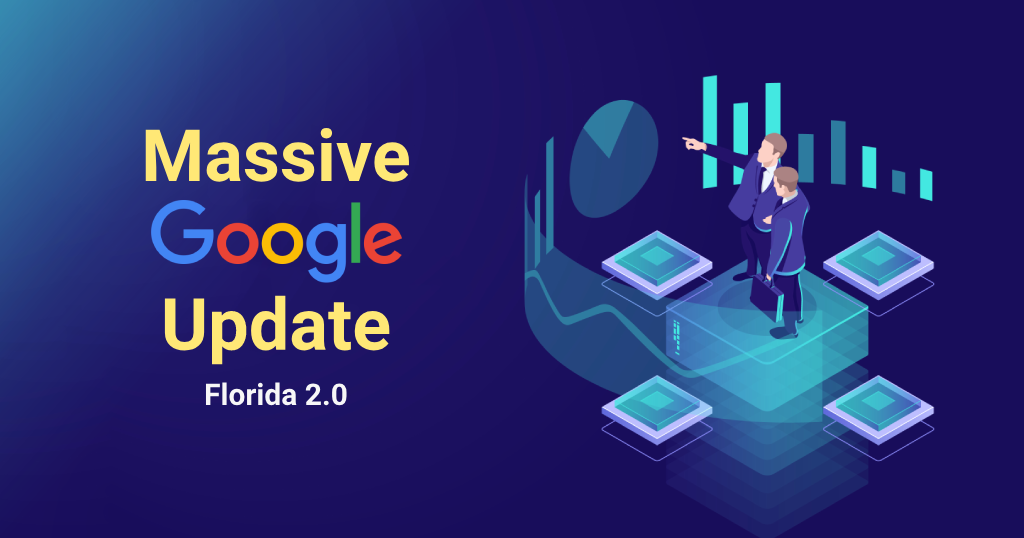
Number 13’s infamy will probably explode even more now, but you need to know that the most recent Google Update started on 12 of March, continued in force on the 13 of March and the rankings fluctuation seems to continue as you’re reading this.
A Confirmed Google Broad Core Update
Leaving modesty aside, we did spot the update before Google making the official announcement and before all the buzz in the SEO world. No, we do not have psychic powers, but we do have a super powerful tool: cognitiveSEO Signals.
While we are aware that search results are different around the world, in different regions, and in different languages, and changing search results is almost a Google trademark, the rankings fluctuations were really high on lots of countries. The daily updates that typically occur in SERP don’t compare to this one in any way. And this time, Google officials also confirmed what the data already told us.
This week, we released a broad core algorithm update, as we do several times per year. Our guidance about such updates remains as we’ve covered before. Please see these tweets for more about that:https://t.co/uPlEdSLHoXhttps://t.co/tmfQkhdjPL
— Google SearchLiaison (@searchliaison) March 13, 2019
Of course, a lot of buzz did not delay to appear on the social media channels, with people complaining about big high volatility as well as dropped traffic and drops.
I’m not sure if you’re familiar with Ian Fleming (the guy that wrote the James Bond series of novels and short stories) byword, but it’s somehow bitter funny how it applies to our current situation.
Once is an accident. Twice is a coincidence. Three times is an enemy action.
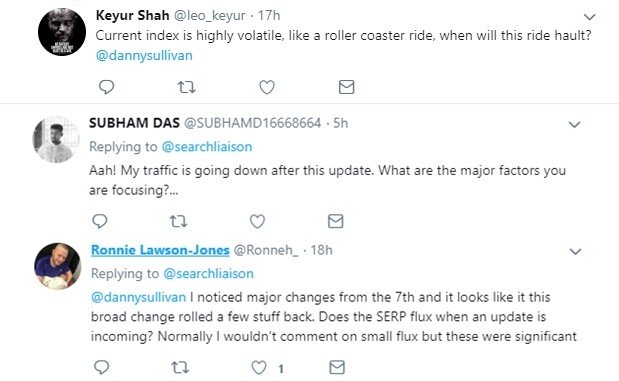
It’s clear that we cannot talk about coincidences at this point as people all over the places are facing rankings fluctuations.
Seeing less Positions, Impressions and Clicks cut in half from countries where my site shouldn’t show up. Surely will see less bounces from total site =)@JohnMu @rustybrick @dr_pete pic.twitter.com/dlkVQrOy3u
— amagnacco (@amagnacco) March 13, 2019
Massive Drops in Search Position Examples
As we don’t like to take anything for granted, we researched and double-checked on real case studies to see how the current update impacted businesses from all over the regions. We used the cognitiveSEO Rank Tracker to easily check and analyze some keywords and their rankings.
We found some massive drops in rankings on commercial keywords with high search volume. Below you can see some screenshots with just some the search position drops we’ve identified.
![]()
We couldn’t find any increases in rankings for the moment, yet this doesn’t mean that increases didn’t occur. I’m sure that in the following days we’ll better understand how this update impacted the Google ranks and as the law of nature works when someone goes down, someone else goes up.
![]()
We’ve done the research on several countries and languages to find out that Florida 2.0 is clearly a global update that affects websites regardless of the country, region or country.
![]()
![]()
What is also important to notice is the amount of keywords websites have lost their rankings on. We’ve found just a few situations were the websites declined in SERP on just a few keywords. Most of the analyzed websites faced drops on half or maybe more than half of the keywords they were interested in ranking for.
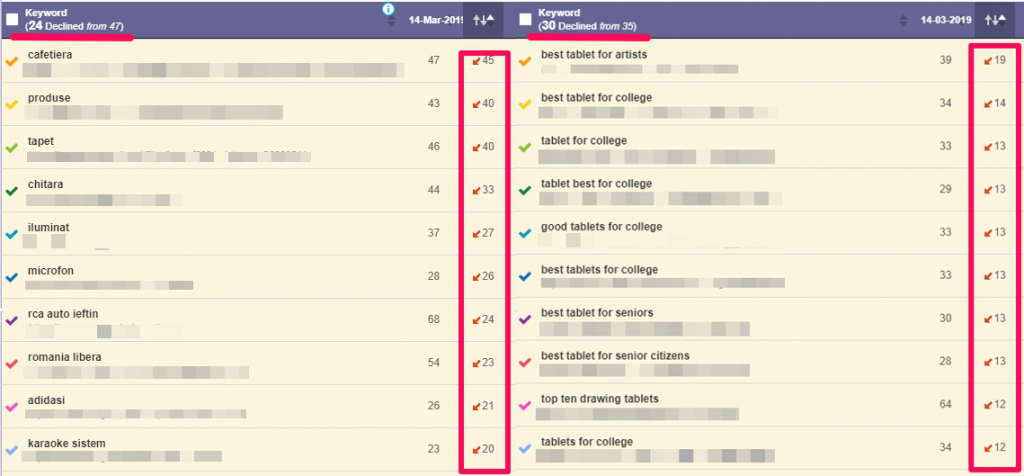
For the moment we cannot draw a conclusion on what the March 12 Google Update actually targeted: links, content, intent, all together, something else? There could be a commonality between the websites affected by this update, yet, further research needs to be done. But keep still, here at cognitiveSEO we are a bunch of geeks who like doing in-depth researches so most likely we’ll come back with more details on what Florida 2.0 is all about.
How Can You Spot Google Updates Before Everybody Else
The truth is that Google doesn’t always disclose updates and algorithm changes. Or, being a bit nasty, we might say that Google rarely makes public its rankings updates. That’s why there is also a lot of buzz and confusion every time someone from the SEO world notices something out of place in SERP.
How did we find about the update before Google making any official statement?
It started with a mail. A notification actually from cognitiveSEO Signals, cognitiveSEO’s tool that spots Algorithm changes in real time.
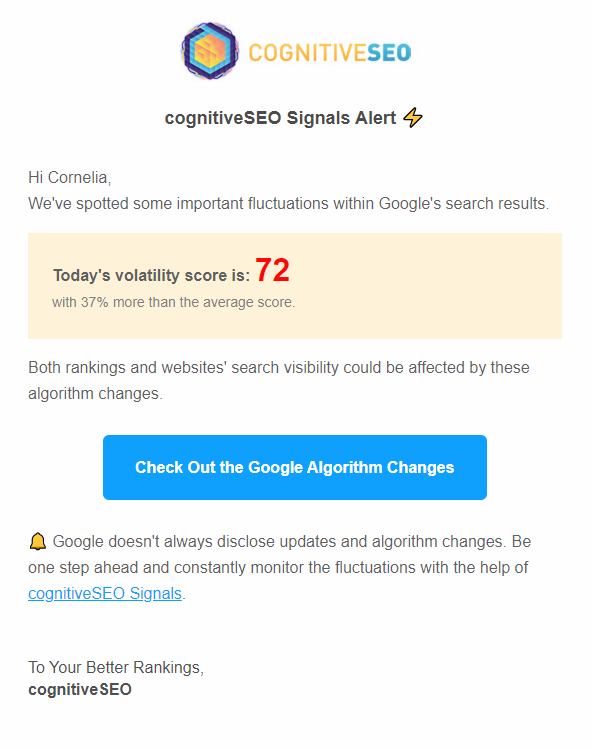
Checking the tool on several countries, positions, and changes, we realized that there is actually something big going on and for sure the biggest fluctuation from the last 5 months for several countries like US, UK, Australia, India, several countries in Europe and so on.
What You Need to Do
The short answer is: it depends on who you’re asking.
If you’re asking Google, the answer you’ll get is :
There is nothing in particular to “fix,” and we don’t want content owners to mistakenly try to change things that aren’t issues.
According to the same big G officials, a broad core update means that Google is not targeting any niche or any particular signals, like quality. In a broad core algorithm update, Google is not targeting anything. There’s no “fix” for pages that may perform less well other than to remain focused on building great content. Over time, it may be that your content may rise relative to other pages. And as with any update, some sites may note drops or gains. There’s nothing wrong with pages that may now perform less well. Instead, it’s that changes to our systems are benefiting pages that were previously under-rewarded….
Of course, as with any update, some sites may note drops or gains. Yet, if you’re asking any SEO Pro or webmaster who is very concerned about his website ranking high, well it is hard to do nothing while your ranks are dropping.
We are not saying that you should look for issues on your website where they are not, or to start changing stuff just for the sake of the algorithm update. Yet, there are some actions that you can take.
- Check that your site is performing well from an on-site point of view
- Check your link profile
- Check your SERP positions
- Keep an eye on the Google Algorithm Updates
And yes, you can check everything by using only one tool: the cognitiveSEO toolset.
Desktop vs Mobile Rankings Fluctuations
There is no secret that mobile searches in Google are constantly growing from one year to another. And therefore, Google’s interest on mobile search market is increasing as well. What is very interesting to notice is that when it comes to ranking fluctuations, the mobile SERP is way more volatile than the desktop one.
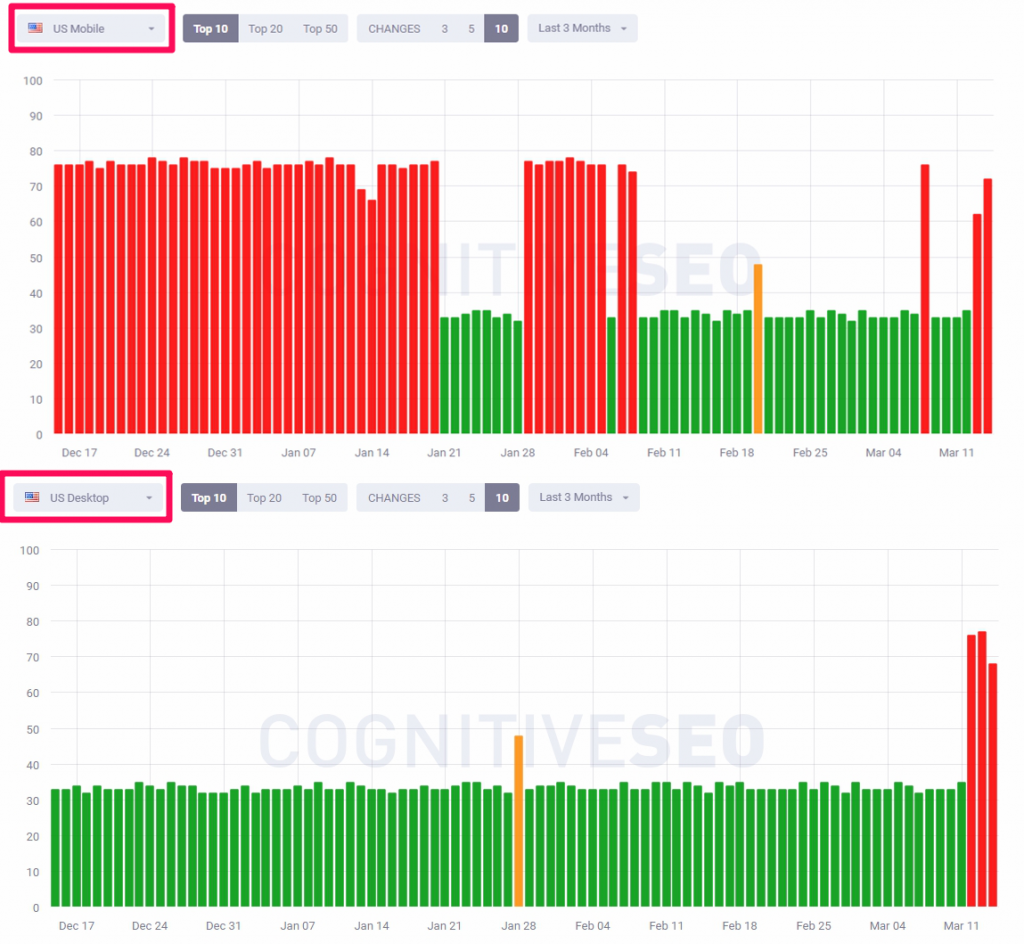
If the current algorithm (named Florida 2.0) is the biggest Google fluctuation on desktop from the past five months, when it comes to the mobile market, the situation is completely different. Dozens of fluctuations and lots of volatility can be easily observed on the screenshots taken from the UK and USA mobile vs. the desktop search market.
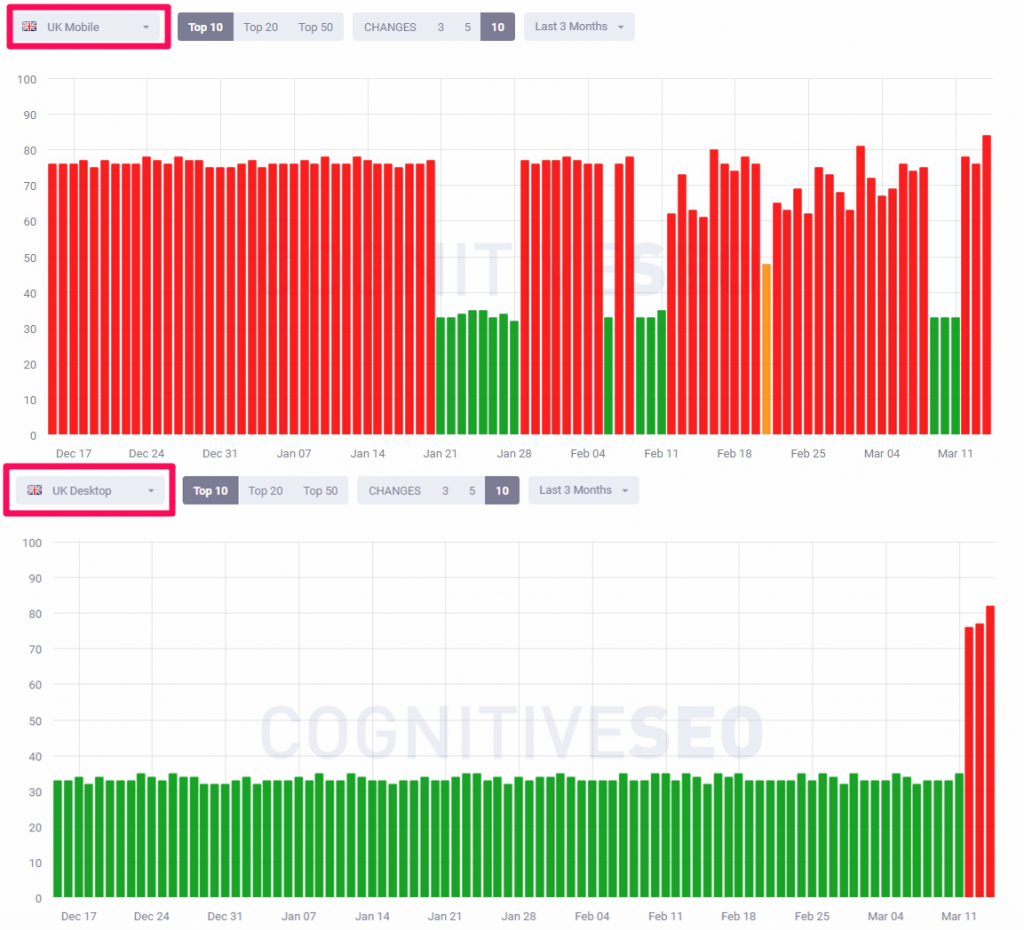
Why Is This Google Update Named March 2019 Core Update?
If you’re checking the WebmasterWorld Forum or read SEO Pros opinion on this Broad Core Update, you’ll see that it is referred to as the Florida 2.0.
Where is all that coming from?
Well, Google Florida was the first major algorithm update and it was released in November 2003. This, of course, was the first significant update in what would become a decade filled with huge updates. Regardless of what it was called, Florida hit in the middle of the holiday shopping season targetted highly commercial terms. As you can imagine, lots of pages and businesses have been wiped out from Google’s SERP.
As you might tend to think that these two updates are similar in the way of rolling, what they actually have in common is the name. Google Updates were always given names by the search industry; it was not Google’s officials who named their updates Fred, Penguin or Panda. And the Florida update was named this way due to the fact that it was released around Pubcon Florida SEO conference taking place. History repeats and with the update and the conference taking place in the same month, Florida 2.0 came naturally.
Yet, the novelty came from Google this time as, to everybody’s surprise, the officials decided to name the update themselves; this is why this current update is called March 2019 Core Update.
There is a long history on naming the Google Updates and the WebmasterWorld used to name them. Will this be the end of an era and will Google name their updates by themselves from now on? We’ll wait and see.
How about you? Did you encounter any ranking or traffic fluctuation? Let us know in the comments below!

 Site Explorer
Site Explorer Keyword tool
Keyword tool Google Algorithm Changes
Google Algorithm Changes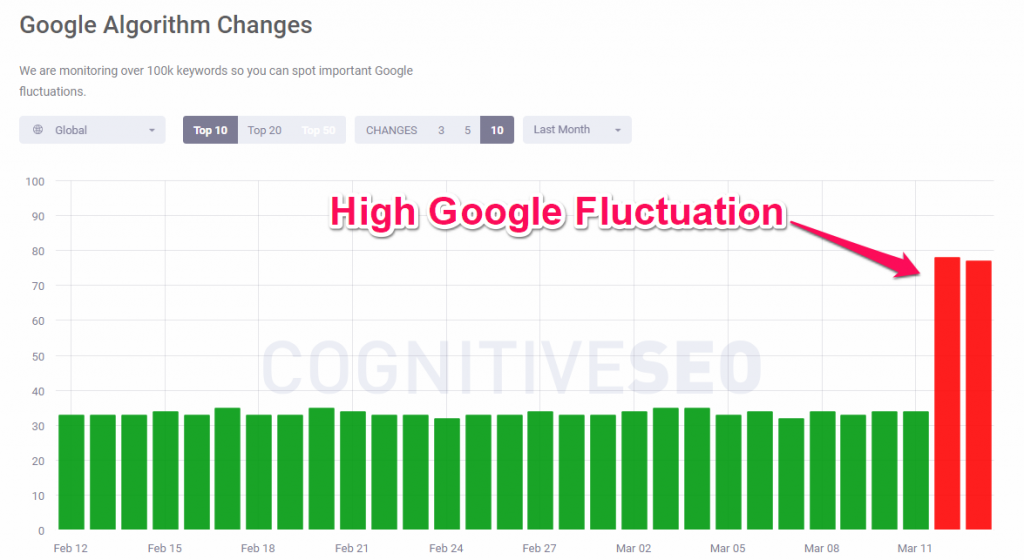
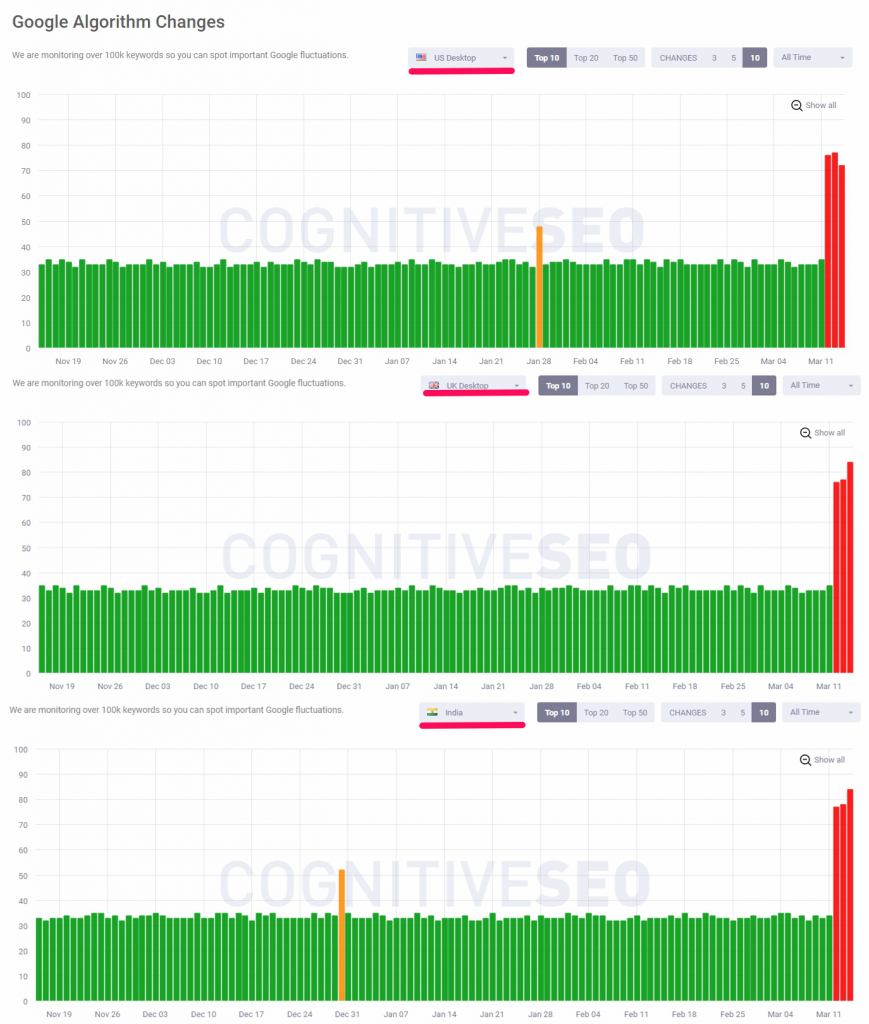


My website also affected from this update. all oraganic traffic goes down by 70%. Any suggesation ?
Sorry to hear that Gaurav!
Can you share with us the niche your business is in?
Also, did you check your content, link profile,everything good?
Saw some huge traffic spikes last sunday, not sure if it was because of this… Now its less, but still more then it was… Hopefully it will stay this way 🙂
There has been a lot of fluctuation lately. Hope your ranks will stay up 🙂
Finally an update that benefits my sites. Seeing growth in traffic and better positions across the board. Have been concentrating on quality content for the last 3 years and seems it’s finally paid off, after actually having my main KW disappear from the Top 100… it’s coming back, now on #21! 🙂
Happy, happy.
Wow, nice growth! Congrats!
can you share what did you focus on content exactly? Better optimized content? Simply more content? More focused on user intent? Did you use any tool to optimize the content?
Thanks in advance! 🙂
Travel niche: I went through the whole content, updated the info, completed what was missing and reorganized in many cases within sections: what to do, how to get there, where to eat, where to stay, tips, map, photo gallery and most of the main sections created original videos.
Did create new content too, some 10 long form articles.
Some sections I optimized using cognitiveseo’s content tool, but rankings actually went down, maybe they are kicking in now?
After a Google Slap in 2012, I decided to always do things by the book, zero proactive link building, zero grey-hat, zero KW stuffing, of course, no black-hat, just looking at things as a website visitor and what I would like to know and find.
People did funny stuff in the early days because Altavista, then Google wasn’t very smart, they forced normal, straight shooting people into doing things the wrong way too, to survive.
Seems the time is coming when G will be smart enough to weed out the bad guys and level the playing field for all who do things the right way: by the rules.
Nice to hear that but specially glad to see that “by the book” work gets rewarded.
Keep up the good work!
Thank you for the update. I notice that in my new blog site in a competitive niche the ranking are and traffic is higher now because of this update. I believe that if you’re not trying to manipulate Google and work by the book at must cases you will be fine.
I am also happy when I see good, hard-work being rewarded. 🙂
Keep up the good work!
Very useful, thanks a lot!
I am very happy with the update. Websites that had no visitors now rank much better and get some traffic.
Ben,
Glad your sites are doing better now. Can you share with us the sites or if that’s not possible the niche or some keywords? thanks!
Great post, congratulations! Do you know the purpose of this update?
Thanks, Cristiano!
As Google always says, they constantly update their algorithm but some updates have more impact than others. We still try to find some communalities to figure out what did this update target.
Hope to be back with some answers soon.
Hey my site is down.. ??? Any solution
Sorry to hear that!
Did you do a check up of your site? Everything safe and sound (content, links, on site, etc.)?
Very Informative blog thanks for sharing with us. Don’t know whether its due to the update or due to the digital marketing company that I have hired for my business, it really helped me a lot to get leads for my business. I am so happy with my progress after a long long time my business is going on the right track.
Sir My site’s traffic is down after Google update is live. What should I do for this? Make Backlinks or update my content? Will be thankful to see your great answer.
Sorry to hear that Haseeb!
Did you check your link profile as well as your content? Everything seems OK from an on-site point of view?
Do you know how long will this update take? Don’t know if I should expect changes right now or will it take more time to affect whole Google index. Can’t see much changes for most of the keywords I am focusing on.
This a great article.
The website I manage has a +33% respect 1 week ago (from Tuesday to today). We talk about offers, comparison and guide in energy and telco.
All keywords is going up day by day, commercial and not.
I still don’t understand why, I only know that all site is seo oriented in contents and well structured development side.
or at least I think 😉
Very useful this post, thanks!
Glad to hear that, Marino!
Your SEO efforts seems to have paid off. 😉
Informative post; really useful thanks!
Finally an update I am happy with. I have had mild growth in organic search after this. I am a food blogger.
It will be interesting to see how this translates from the short term (days and weeks) into the medium term (months).
As always with core updates there will be those that take a somewhat rushed and reactionary approach without knowing what the issue is. Then starting a blind panic.
From my perspective I noticed it affected mainly newly acquired high ranking keywords and seemed to be more about Google testing quality metrics and search intent from those boosts and drops.
We have had a horrible go of it in the past 6 weeks. We try to manage our site ourselves and do not a tech person. We have been burned so many times with high fees , contracts and no results-we are frustrated and tired. Seriously thinking of closing down-which is terrible because we provide such a wonderful product and have truly transformed lives.
Tracy
Owner
Hi, Tracy!
I am really sorry that things are not going well with your business.
Did you identify the cause of your ranking drop?
I really appreciate your nice efforts. Thanks for sharing this.